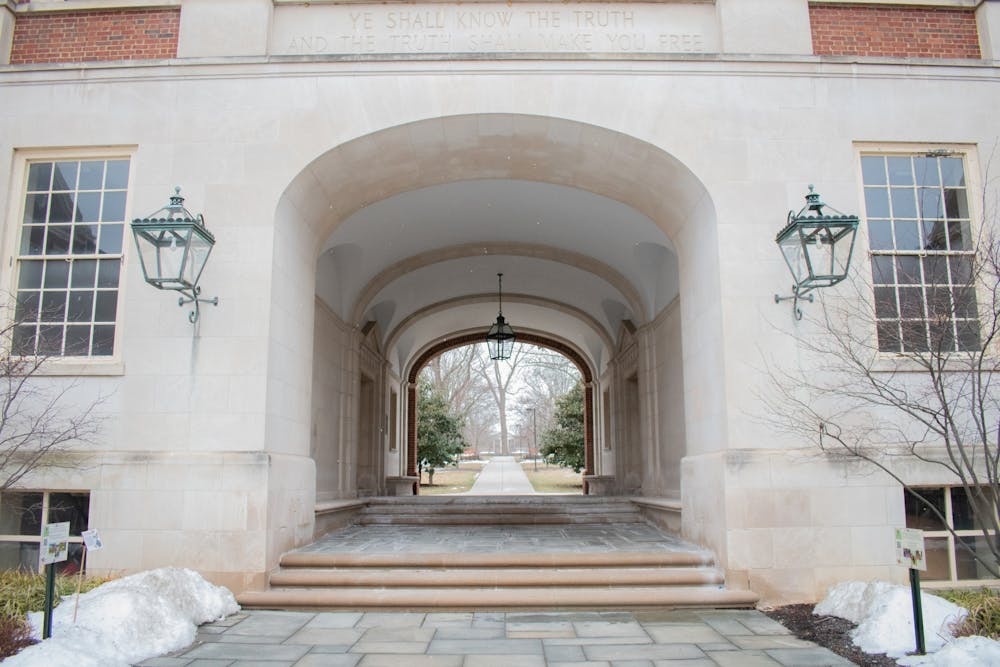On Wednesday, the Ohio Senate passed a bill that would create “intellectual diversity” centers at five Ohio universities, including Miami University, but Miami wasn’t included until hours before the vote.
Senate Bill 117 (SB 117) passed with a vote of 25 to 7 along party lines. The bill was first introduced in May, sponsored by Senators Jerry Cirino (R. Kirtland) and Rob McColley (R. Napoleon).
When the bill was initially introduced in the Senate, the legislation only named the Institute of American Constitutional Thought and Leadership housed within the University of Toledo’s College of Law and the Salmon P. Chase Center for Civics, Culture, and Society at The Ohio State University’s College of Public Affairs.
It passed the Workforce and Higher Education Committee on June 7 with that legislation, but as it made its way to the Senate floor, three universities were amended in.
Before it passed in the Senate, Cirino introduced an amendment to include Miami, along with the University of Cincinnati and Cleveland State University.
According to SB 117, the center will be an “independent academic unit” located within the College of Arts and Sciences (CAS).
“The center shall conduct teaching and research in the historical ideas, traditions, and texts that have shaped the American constitutional order and society,” the legislation states.
Dean Makaroff, the dean of CAS, declined request for comment due to the uncertainty on if the legislation will be enacted.
The center at Miami is not yet named, a task for the Board of Trustees, but it will offer instruction on “the principles, ideals, and institutions of the American constitutional order,” and it will offer debates and university-wide programming to promote civil discourse and free speech.
The Board is also tasked with appointing a seven-member academic council to oversee the operation of the center by Dec. 31 if the bill becomes law. The council is required to have relevant experience, and only one member can be an employee of the university. Each of the members will be subject to term limits, with three members serving two years and four members serving four years, which will be decided at the first council meeting.
The council is also tasked with conducting a “nationwide search for candidates for the director of the center.” President Crawford will make the final decision of who will serve in the director role, upon approval of the Board of Trustees.
The director will have the protection of tenure or tenure eligibility and will report directly to Provost Liz Mullenix and President Crawford, according to SB 117.
Enjoy what you're reading?
Signup for our newsletter
Miami will also receive $2 million to support the center.
In an email to The Miami Student, Alecia Lipton, associate director of media relations, wrote that the university looks forward to partnering with the state moving forward.
“Miami University is committed to fostering an environment that supports informed and engaged citizens, inclusive excellence, and diversity of thought,” Lipton wrote, “and our Menard Family Center for Democracy and Janus Forum are great examples of how we fulfill those ideals.”
Most of the offerings the new center will provide mimic the services of Miami’s Menard Family Center for Democracy. According to their website, the center “builds the capacity of citizens and communities to collaborate in solving problems across ideological, political and social lines.”
Although the bill has been thoroughly discussed in the Senate, as it heads to the state House of Representative, the controversy surrounding the bill is growing.
SB 117 creates controversy for Miami
Over 40 individuals and organizations submitted testimony advocating both for and against the bill before it was updated to include Miami.
Only one person with a Miami connection offered any feedback prior to the amendment.
Mark Ridenour, an alum of Miami and chair emeritus of the Board of Trustees, submitted testimony as a proponent of the bill for its first hearing in May. In his testimony, he acknowledges the achievements of similar institutions such as the Hamilton Center at the University of Florida and the Institute of American Civics at the University of Tennessee.
“Such centers or institutes represent a growing, national movement … Ohio should not be left behind,” Ridenour wrote.
He concluded his testimony with his only critique of the bill: that it didn’t include Miami, but with the most recent amendment, Miami will not be left out.
The Faculty Alliance of Miami criticized the Senate’s move to include the last-minute amendment in a tweet, writing that “no one from Miami U had a chance to testify about it” and the decision to give the director explicit oversight of the curriculum and staffing means “faculty expertise is to be ignored and [University] Senate cannot exercise quality control.”
Others are concerned that the bill aligns too closely with state Senate Bill 83, also sponsored by Cirino, which would limit diversity, equity and inclusion programs at public state universities and prohibits professors taking a stance on controversial subjects such as climate and foreign policy, electoral politics, immigration and abortion.
“Both bills employ similar language, such as the desire to ‘affirm the value of intellectual diversity in higher education and aspire to enhance the intellectual diversity of the university,’ as stated in line 24 to 26 of SB117,” Vinicius Cervilieri, a masters student at OSU, wrote in his testimony for the bill’s third hearing.
Another critique of the bill is the vague language and lack of definition throughout the legislation. Throughout the bill the phrase “intellectual diversity” is mentioned, but it is never defined.
“What do the sponsors intend by intellectual diversity?” Cervilieri wrote. “These questions have been raised repeatedly but remain unanswered.”
Randi Thomas, the vice president of ASPIRE at Miami, did not immediately respond to request for comment.
The bill will head to the House for a vote, and if passed, it will go to the desk of Ohio’s Governor Mike DeWine.




